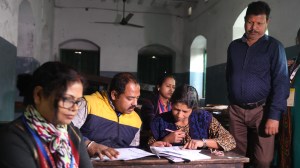Lady Lucknow
Mayawati8217;s life, alas, gets equated with the BSP8217;s journey

Behenji: A Political Biography of Mayawati
Ajoy Bose,
Penguin,Rs 499
A person is a product of the times, and the biography of a politician is at least expected to capture the romance between him/her and the realities of the time. The expectations will rise when the person in question is Mayawati, who, after her single-handed victory in the Uttar Pradesh assembly elections last year, established her credentials as a politician with more potential and promise than what most parties earlier gave credit for. But it is not just political parties that are interested, even academics and laypeople are keen.
Ajoy Bose, however, treads a very simple path, narrating the history of the Bahujan Samaj Party BSP, currently headed by Mayawati, and its journey till last year8217;s Uttar Pradesh elections. Given the sketchy details the book offers on Mayawati8217;s early life, Bose seems to equate her life with the BSP8217;s journey, crediting her for the party8217;s success and blaming the conspiracies of other parties for any setback. Even as it argues that Mayawati holds great promise, the book fails to bring out the political personality that Mayawati is and her life in the political arena.
There is little doubt about Mayawati8217;s political role for some time to come, but one wants to know more about how she won the trust of her mentor and BSP founder Kanshi Ram, other than what the couple of anecdotes offer. We don8217;t find out whether Mayawati won his trust or he surrendered his baton to her. This is pertinent, since the book mentions that Mayawati had no clue about Kanshi Ram cutting a deal with Mulayam Singh Yadav to form a government under Mulayam, and then again about Kanshi Ram entering into an agreement with the BJP to form a government under Mayawati. Yet, the book does not hesitate to make the assumption that Mayawati has always been the BSP and vice versa.
After her first chief ministership, Mayawati entered popular consciousness, but the book returns to the travails the BSP faced till the assembly polls last year. It is nothing more than what the newspapers reported on the BSP-BJP alliance, her social engineering and other issues. Although Bose narrates the chronology with utmost sincerity, he is just providing a refresher course on the BSP8217;s encounter with power in Lucknow and Mayawati8217;s place therein.
In Section Two, Bose takes up several questions on Mayawati8217;s future plans and makes sweeping observations about her wealth, the chances of her becoming the prime minister, democracy in the BSP and how to sustain the party in the long term.
One cannot blame Bose who has categorically stated that the book is not an official biography, accepting that it is devoid of 8220;heart-to-heart8221; confessions by Mayawati. However, he could have talked to more people who crossed Mayawati8217;s path in her meteoric rise.
Nonetheless, given Mayawati8217;s persona, one thing is for sure. There will be many more books on her and this book definitely offers a good first look at the BSP8217;s, and Mayawati8217;s, rise.
- 01
- 02
- 03
- 04
- 05































